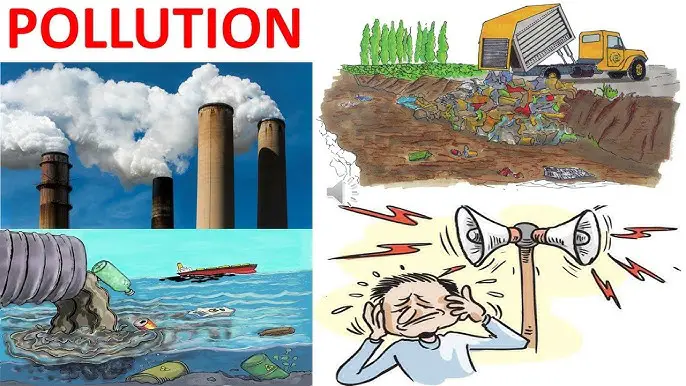Soil, Radioactive Pollution And Noise Pollution


Soil Pollution
Soil pollution is the adverse alteration of soil by the addition or removal of substances that reduce soil productivity and groundwater quality. It usually results from various human activities such as dumping of wastes, use of agrochemicals, mining operations and urbanization.
Soil Pollution: Causes and Effects
• Industrial solid waste and sludge contain toxic organic and inorganic compounds as well as poisonous metals. • Radioactive waste from nuclear power plants and nuclear explosions also contaminate soil. • Fly ash contains fine particulates that are released from thermal power plants. It settles on the ground and causes pollution. • Domestic garbage is rich in organic matter and underdecomposition. • Hospital waste contains a variety of pathogens that can seriously affect human health.
Soil Pollution: Causes and Effects
Agricultural chemicals like insecticides, pesticides and inorganic fertilizers can pollute drinking water and alter the chemical properties of soil by adversely affecting soil organisms.
Control of Soil Pollution
• Soil waste management involves collection and classification of wastes. Recovery of resources like scrap metals, plastics, etc. for recycling and reuse. Safe disposal and safe disposal with minimum environmental impact is to be followed. • Other notable methods of waste disposal include incineration (burning in the presence of oxygen) and pyrolysis (burning in the absence of oxygen). • Afforestation and reforestation should be done on a large scale to prevent soil erosion and loss of soil nutrients.
Radioactive Pollution
Emission of protons, electrons and electromagnetic radiations released by the disintegration of radioactive substances like radium, thorium, uranium, etc. Causes air, water and land pollution. Effects: • Ionizing radiations may cause mutations. • Strontium-90 causes bone cancer in bones. • Iodine-131 may damage bone marrow, spleen, lymph nodes and cause leukemia (blood cancer).
Radioactive Pollution: Preventive Measures
• Care should be taken to prevent leakage of radioactive substances from reactors. Nuclear • Radioactive waste should be disposed of safely. • Strict measures should be followed in construction and maintenance of nuclear power plants to prevent nuclear accidents. • Control or prevention of nuclear tests.
Noise Pollution
• Noisemaybedefined as an unwanted and unpleasant sound that may have adverse effects on animals and humans. • The unit of sound level is decibel (dB). • Noise level above 120 dB is considered harmful to human beings.
Noise Pollution Sources and Effects
Sources • Various sources associated with noise pollution are industrial machinery, road, rail and air transport, loudspeakers, construction equipment, domestic appliances, firecrackers, etc.
Effects • Noise seriously affects heartbeat, breathing, and can cause constriction of blood vessels. • It can cause headache, sleeplessness, irritability, nervousness and can seriously affect the productive performance of human beings. • Loud noise (above 130 dB) can cause damage to ear drum, hair cells of cochlea (organ of hearing) and result in fading or permanent loss of hearing. • Itcanalso seriously affect the concentration of students during learning.
Noise Pollution: Control Measures
• Industries should be set up away from residential areas. • Trees should be planted on the roadside or along highways to reduce the noise level. • Industrial machinery and motor vehicles should be properly maintained to reduce noise. • Use of loudspeakers and bursting of firecrackers should be restricted. • Efforts should be made to create awareness among people about the harmful effects of noise and the need to control it.
Waste Generation in India
• India currently produces 55 million tonnes of municipal solid waste annually. • Per capita generation of waste varies from 200 grams to 600 grams per capita/day. • Average generation rate in cities is 0.4 kg per capita per day. • Collection efficiency ranges between 50% to 90% of the solid waste generated.
Read Also:
- Water Pollution
- Environmental Pollution And Air Pollution
- Soil Pollution Causes, Types, Effects And Control Measures
- Water Pollution: Reasons, Negative Effects And Prevention Methods
- Effects Of Environmental Pollution‘
- Causes Of Environmental Pollution
- Major Types Of Pollution
- Environmental Pollution
- Effects Of Pollution On Aquatic Biota
- A Review On The Effects Of Water Pollution On Freshwater Fish Species
- Water Pollution: Causes, Negative Effects And Prevention Methods
- Prevention Of Water Pollution
- Effects And Control Ways of Water Pollution
- Introduction To Water Pollution
- Introduction And History Of Anthropogenic Pollution
Recent Posts
At Present, Most Bank Employees In India Are More Concerned About Their Salary Rather Than Their Work
In recent years, there have been significant changes in the banking sector in India, both…
Bank Of Baroda: Special Need To Educate Employees For A Strong And Inclusive Banking Future
One of India's leading public sector banks, Bank of Baroda played an important role in…
Need To Adopt A Fully Educated Employee System To All Banks Of India To Help Uneducated And Untrained Persons In ATM Transactions, Money Deposits And Debit
India, being a vast and diverse nation, is a complex group of people with various…
Need To Adopt A Fully Educated Employee System For All Banks Of India To Fill The Form And Assist In Other Banking Works To Uneducated And Untrained Persons
India, the second largest population of the world, is home to immense variations-not only in…
Prominent Person Of The Reserve Bank Of India (RBI)
The Major Banking Institute of India, the Reserve Bank of India (RBI), has been managed…
Most Senior Employees Of Bank Of Baroda, Including Branch Managers, Are Uneducated And Untrained
Bank of Baroda is a major public sector financial institution in India, but despite its…

